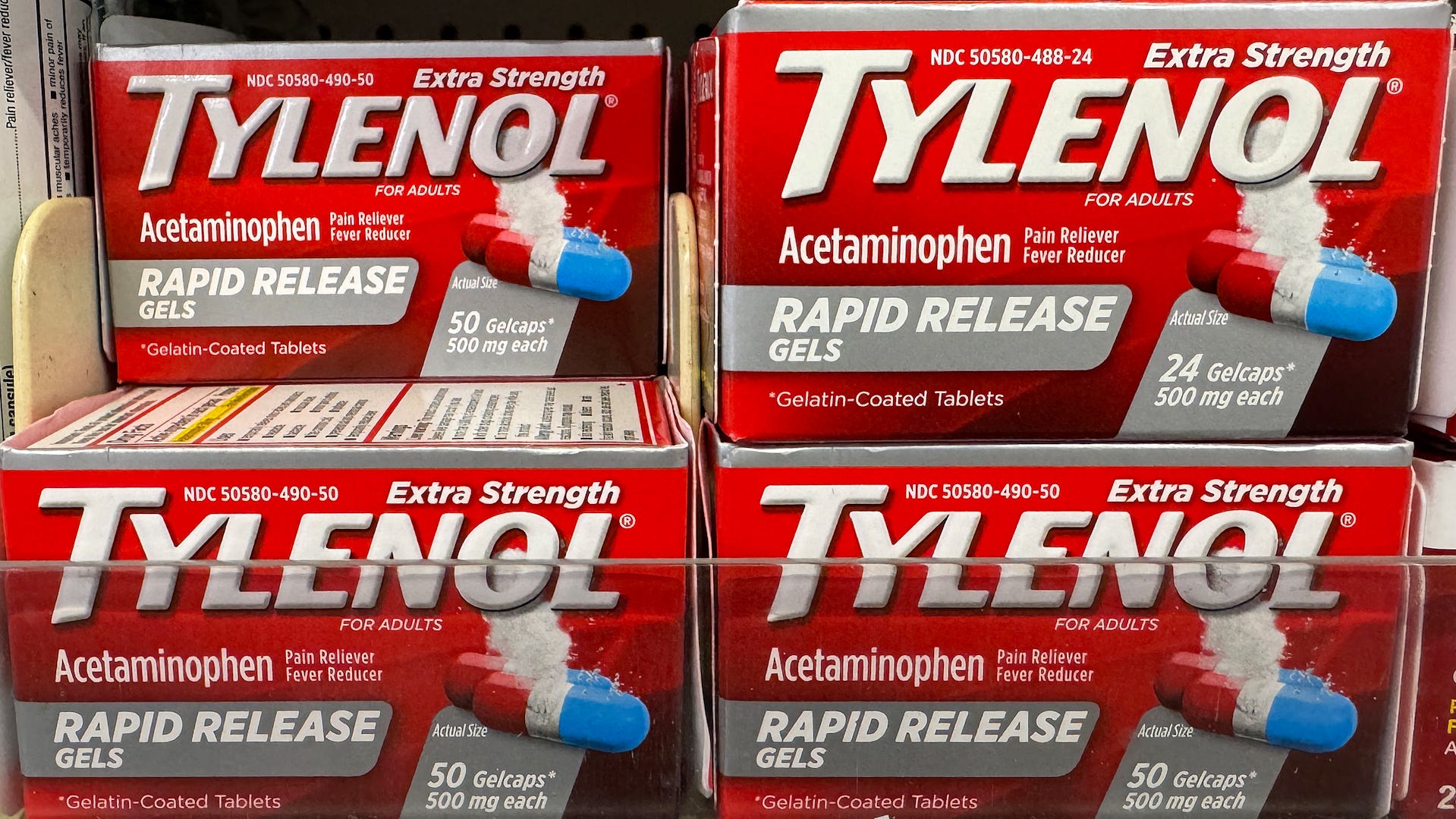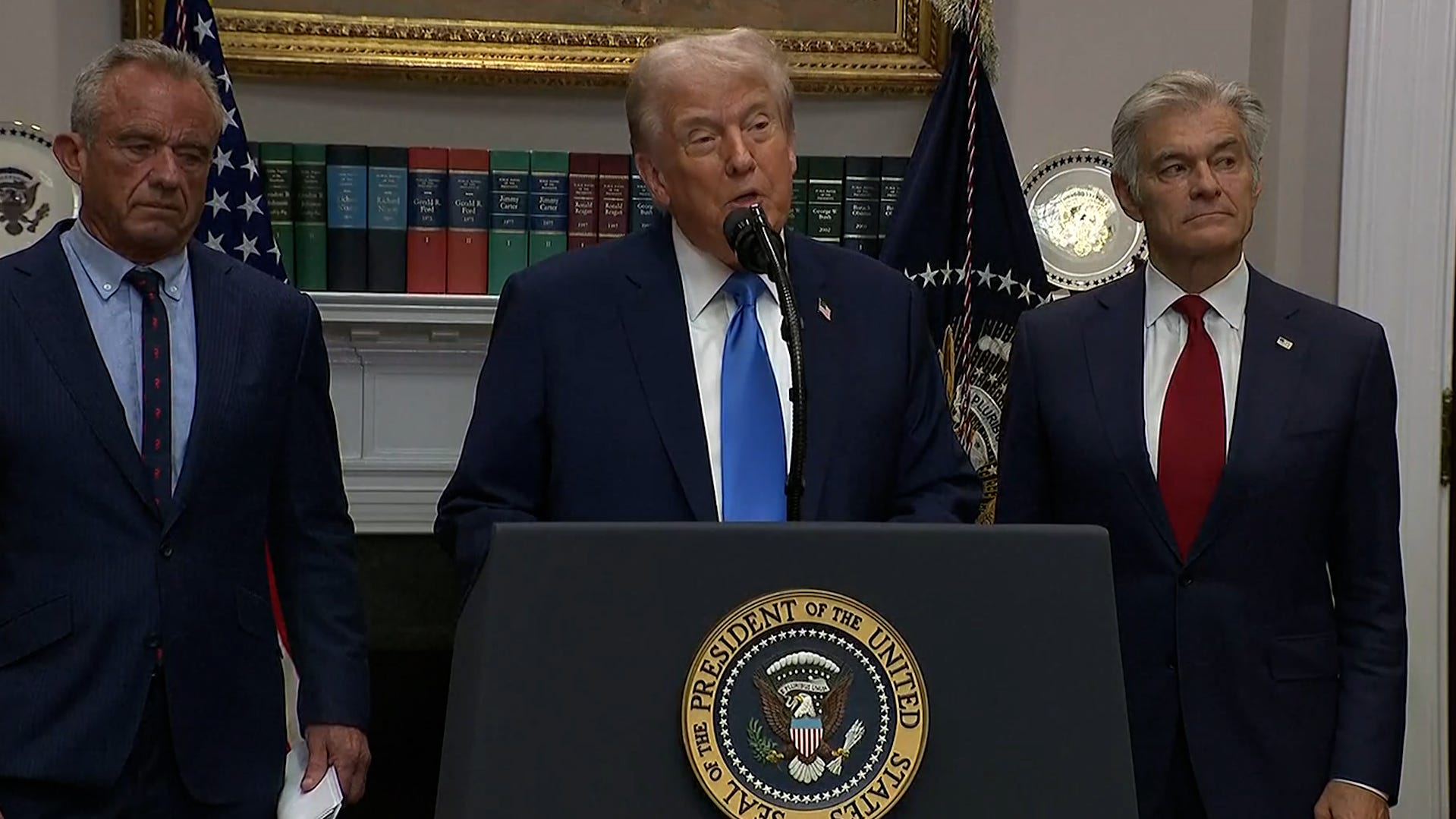Health experts say no single source is likely to blame for autism. And doctors say acetaminophen, the active ingredient in Tylenol, is safe to use.

President Trump warns pregnant women against Tylenol use
President Donald Trump cautioned pregnant women against Tylenol use. Tylenol parent company Kenvue says it is proven to be safe.
WASHINGTON ‒ President Donald Trump urgently warned pregnant women to avoid taking Tylenol as he promoted an unproven link between the painkiller and a rise in autism among children.
“Don’t take Tylenol,” Trump said repeatedly during a Sept. 22 news conference alongside Health and Human Services Secretary Robert F. Kennedy Jr. “Fight like hell not to take it.”
Trump said the Food and Drug Administration will soon notify physicians the use of acetaminophen, the active ingredient in Tylenol, is associated with an increased risk of autism and that woman should avoid the painkiller during pregnancy. He said women should also avoid giving Tylenol to their newborn babies.
Kennedy said the FDA’s recommendation is based on clinical and laboratory studies. Yet health agencies across the world and other medical experts have not found a definitive link between Tylenol and autism.
Experts say multiple factors contribute to autism, and the Society for Maternal-Fetal Medicine and the American College of Obstetricians and Gynecologists both endorsed using acetaminophen during pregnancy this month.
Trump said pregnant women who can’t “tough it out” without Tylenol should limit their intake. Kennedy said HHS is encouraging physicians to exercise their “best judgment” by prescribing the lowest effective dose for the shortest necessary duration.
In addition, Trump said the FDA is approving the medication leucovorin for the treatment of autistic children upon prescription. The president also urged parents to ignore vaccine schedules for their children.
“Don’t let them pump your baby up with the largest pile of stuff you’ve ever seen in your life going into the delicate little body of a baby,” Trump said, without providing evidence for the need to split up vaccines.

Trump administration links Tylenol to autism. Here’s what experts say
The Trump administration linked Tylenol to autism risk in pregnancy, but experts say it’s safe and warn against untreated fevers.
The American Psychiatric Association issued the following statement in response to today’s announcement:
“It is essential that the administration prioritizes evidence-based support for individuals on the autism spectrum and invests in long-term comprehensive research about the disorder.
“Vaccines do not cause autism. Claims of any such association have been repeatedly discredited in peer reviewed studies.
“Autism is a complex disorder, and it is incorrect to imply that a handful of studies have established causation. A strong base of evidence shows that acetaminophen, when taken as directed, is safe for use during pregnancy. Any decisions around a course of treatment should be determined by a patient and their doctor.
“Leucovorin (folinic acid) has not been a recommended treatment for autism. It will require many more years of research before we know if leucovorin is an appropriate treatment for individuals with autism.
“Autism spectrum disorders exist on a spectrum of neurodiversity. The country must focus its resources on expanding access to care and to building the evidence-base for future treatments.”
–Ken Alltucker

Autism and Tylenol: Trump press conference takeaways
President Donald Trump and Health and Human Services Secretary Robert F. Kennedy Jr. make controversial claims on Tylenol and autism
Tony Lyons, president of MAHA Action told USA Today that today’s autism announcement is just the start.“We have what we haven’t had for decades, an administration that is open to real science, to dozens of possibilities. It’s a profound culture shift—from a culture of corruption to a team that will turn over every last stone and give the public real science, real answers,” said Lyons. “The MAHA movement celebrates this existential change.”–Swapna Venugopal Ramaswamy
Autism announcement by Trump is “malpractice” says medical ethicist
Arthur Caplan, founding head of the Division of Medical Ethics at NYU Grossman School of Medicine called the announcement on autism “the saddest display of a lack of evidence, rumors, recyling old myths, lousy advice, outright lies, and dangerous advice” he’s ever witnessed.Caplan told USA TODAY what was said was not “only unsupported and wrong but flat out malpractice in managing pregnancy and protecting fetal life.”
–Swapna Venugopal Ramaswamy
President Donald Trump questioned other vaccination norms, including saying that the hepatitis B vaccine should be given at age 12, rather than within the first 24 hours of life.
“That’s sexually transmitted,” he said. “We think you should wait, I think you should wait until 12.”
The Centers for Disease Control recommends that the first hepatitis B vaccine be given within 24 hours of birth. The next shot is usually given at 1 to 2 months of age and the third is given between 6 months and 18 months of age.
Hepatitis-B is not just spread through sexual contact. An infected mother can also pass it to her baby at birth and a young child can also get hepatitis B from close contact with infected family members. A baby infected with hepatitis B has about a 90% chance of developing a lifelong, chronic infection, according to the Centers for Disease Control.
–Sarah D. Wire
Trump said there’s “no downside” for a woman to choose not to take Tylenol during their pregnancy.
“Other than a women will have to, as I say, tough it out a little bit,” Trump said. “There’s no downside to doing this. It’s not like, oh if you do this, you’re going to die.”
The Society for Maternal-Fetal Medicine, however, has warned that untreated fever during pregnancy can carry “significant risks” for both the mother and the child.
–Joey Garrison
President Donald Trump urged parents to ignore vaccine schedules. Although he provided no evidence to support the suggestion, he said that parents should split vaccines over multiple doctor visits.
“Instead of one visit where they pump the baby, you load it up with stuff,” he said. “Don’t let them pump your baby up with the largest pile of stuff you’ve ever seen in your life going into the delicate little body of a baby.”
Secretary of Health and Human Services Robert F. Kennedy Jr. did not speak to the vaccine schedule. The Centers for Disease Control sets vaccine schedules.
–Sarah D. Wire
Trump urged women to “fight like hell” not to take Tylenol during their pregnancies and warned them not to give it to their newborn babies, either.
“Don’t take Tylenol. Don’t have your baby take Tylenol,” Trump said. “Tylenol is fine for people that aren’t pregnant, that are in the situation, but we are talking about one very specific situation.”
–Joey Garrison
The FDA is approving the medication leucovorin for the treatment of autistic children upon prescription, according to Mehmet Oz, administrator for the Centers for Medicare & Medicaid Services.
Oz said state Medicaid programs, in partnership with CMS, will cover the prescription around the country.
“It’s yours, but you have to go to a doctor to get a prescription,” Oz said.
–Joey Garrison
Healthy and Human Services Secretary Robert F. Kennedy Jr. said HHS will launch a nationwide public service campaign informing families about the risk of taking Tylenol while pregnant.
Kennedy said the FDA recognizes that acetaminophen, the active ingredient in Tylenol, can be essential to treat fevers and pain during pregnancies.
As a result, he said HHS is encouraging physicians to exercise their “best judgment” by prescribing the lowest effective dose for the shortest necessary duration.
–Joey Garrison
President Donald Trump incorrectly said that some groups, such as the Amish, do not have autism cases.
Experts who study Amish communities have found many documented cases of autism among the Amish, although sometimes at lower rates than the broader population.
Social media users have frequently pointed to that occasional lower autism rate as a reason not to vaccinate children. Experts also say that most members of the Amish community have some level of vaccination and other environmental factors could account for the lower autism rate.
–Sarah D. Wire
Trump cited “a rumor” that no people in Cuba have autism as he announced the FDA’s recommendation that pregnant women should not take Tylenol.
“There’s a rumor – and I don’t know if it’s so or not – that Cuba, they don’t have Tylenol because they don’t have the money for Tylenol. And they have virtually no autism. OK?”
“Tell me about that one,” Trump added. “The way I look at it – don’t take it. Don’t take it.”
–Joey Garrison
Trump announced the Food and Drug Administration will notify physicians that the use of Tylenol during pregnancy is associated with an increased risk of autism.
“Taking Tylenol is not good. I’ll say it: It’s not good,” Trump said.
Trump said all pregnancy women should talk to their doctors for more information about limiting the use of medication.
“Ideally a woman won’t take Tylenol,” Trump said.
–Joey Garrison
What does the science say?
While autism rates have been steadily increasing, an exact cause has eluded the scientific community for decades.
A large study encompassing over 100,000 participants found that higher-quality studies tended to find a link between acetaminophen use during pregnancy and neurodevelopmental disorders in children, according to the report published Aug. 14 in BMC Environmental Health.
More than two dozen studies around the world have linked a pregnant person’s frequent use of acetaminophen to autism and attention-deficit hyperactivity disorder in their child.
But several studies have also found competing evidence.
A 2024 study in Sweden of about 2 million children, over 180,000 of whom were exposed to acetaminophen during pregnancy, found no associations between the pain medication and children’s risk of autism, ADHD or intellectual disability.
Some researchers say the data isn’t so cut and dry. Many health conditions that cause pain or a fever, commonly treated with Tylenol, are also associated with an increased risk of autism and other neurodevelopmental disorders.
It’s difficult to detangle the data of what’s behind the link: Is it the Tylenol or these health conditions? – Adrianna Rodriguez
What is leucovorin? All about the medication being touted as a potential treatment
Trump, Health and Human Services Secretary Robert F. Kennedy Jr. and other Trump administration health officials are expected to discuss a medication called leucovorin as a potential treatment for autism.
But what exactly is that?
Leucovorin, also known as folinic acid, is high-dose prescription drug. More recently, some researchers have sought to study leucovorin as a possible treatment for autism.
The suggestion that a single medication could counteract the effects of autism is sure to be controversial. – Ken Alltucker
Trump to cite ‘gold standard’ medical research into autism: Leavitt
White House press secretary Karoline Leavitt declined to preview what President Donald Trump would announce about autism, but said Health Secretary Robert F. Kennedy Jr. was “paying attention to studies and the gold standard of science and research” that others have ignored.
“The president is very excited about this,” Leavitt told reporters at the White House. “I don’t want to scoop the president of the United States and our secretary of health and human services.”
“I think Americans are going to be enlightened and proud by what they hear,” Leavitt added. – Bart Jansen
How to watch Trump’s autism announcement
Trump’s announcement about autism is scheduled for 4 p.m. ET on Sept. 22. USA TODAY is set to stream the announcement live here. – Bart Jansen
Autism spectrum disorder is the clinical name for the condition most people refer to as autism and is diagnosed based on challenges with social skills, communication and repetitive behaviors. Symptoms vary widely on the spectrum, with some people unable to communicate at all and others highly successful.
Autism diagnoses nationwide have increased significantly since 2000. By 2020, the U.S. autism rate in 8-year-olds was 1 in 36, or 2.77%, up from 0.66% in 2000, according to the Centers for Disease Control and Prevention.
Research spanning decades hasn’t yielded firm answers on what contributes to autism, but many scientists believe genetics play a role, potentially in combination with environmental influences. Kennedy has argued the country has an “autism epidemic” fueled by “environmental toxins.”
Because traits and support levels vary widely, “no single approach fits all people with autism,” says Christopher Banks, president and CEO of the Autism Society of America.
Tylenol parent company Kenvue issued a statement saying independent scientific research shows that taking acetaminophen is “the safest pain reliever option for pregnant women as needed throughout their entire pregnancy.”
The company said that a decade of rigorous research endorsed by leading medical professionals and global health regulators found “no credible evidence linking acetaminophen to autism.”
“We believe independent, sound science clearly shows that taking acetaminophen does not cause autism,” the statement said. “We strongly disagree with any suggestion otherwise and are deeply concerned with the health risk this poses for expecting mothers.”
Still, more than two dozen studies around the world have linked a pregnant person’s frequent use of acetaminophen to autism and attention-deficit hyperactivity disorder in their child.
But several studies have also found competing evidence. A 2024 study in Sweden of about 2 million children, over 180,000 of whom were exposed to acetaminophen during pregnancy, found no associations between the pain medication and children’s risk of autism, ADHD or intellectual disability.
A federal judge ruled that 440 lawsuits against Tylenol makers do not have “admissible evidence” showing a link between prenatal use of Tylenol and autism or ADHD, according to reporting by ABC News. −Zac Anderson and Adrianna Rodriguez
Trump signed an executive order in February creating the Make America Healthy Again Commission, which included studying the threats of certain medications.
Kennedy said at an April news conference that autism was “preventable” and he directed the National Institutes of Health to “identify precisely what the environmental toxins are that are causing it.”
The Centers for Disease Control and Prevention previously found that the rising incidence of autism could be attributed to more access to diagnostic tools and improvements in early detection. Some people with autism spectrum disorder have a genetic condition while other “causes are not yet known,” according to the CDC.
“There will never be a sound-bite answer to what causes autism,” Helen Tager-Flusberg, a psychologist who studies neurodevelopmental conditions at Boston University, Massachusetts, told Nature magazine. − Swapna Venugopal Ramaswamy
Medical guidelines say acetaminophen, the generic form of Tylenol, is safe to use. Acetaminophen is commonly used by pregnant women, who are already advised by the Food and Drug Administration not to use ibuprofen after 20 weeks of pregnancy.
The Society for Maternal-Fetal Medicine and the American College of Obstetricians and Gynecologists both endorsed using acetaminophen during pregnancy in Sept. 5 statements.
“Acetaminophen remains a safe, trusted option for pain relief during pregnancy,” the statement said. “Despite recent unfounded claims, there’s no clear evidence linking prudent use to issues with fetal development.”
Contributing: Daryl Austin, USA TODAY; Reuters
